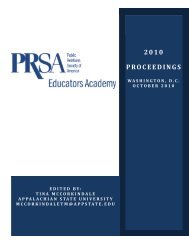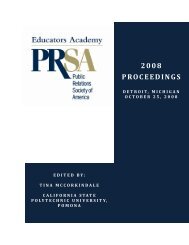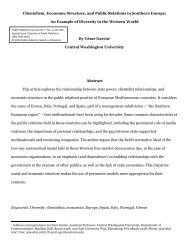2012 PROCEEDINGS - Public Relations Society of America
2012 PROCEEDINGS - Public Relations Society of America
2012 PROCEEDINGS - Public Relations Society of America
Create successful ePaper yourself
Turn your PDF publications into a flip-book with our unique Google optimized e-Paper software.
Assessing the State <strong>of</strong> <strong>Public</strong> <strong>Relations</strong> Ethics Education<br />
Deborah Silverman, Ph.D.<br />
Buffalo State College<br />
silverda@buffalostate.edu<br />
Karla K. Gower, Ph.D.<br />
The University <strong>of</strong> Alabama<br />
gower@apr.ua.edu<br />
Elmie Nekmat<br />
The University <strong>of</strong> Alabama<br />
mbnekmat@crimson.ua.edu<br />
Abstract<br />
Given the importance <strong>of</strong> ethics in public relations, this study explored the state <strong>of</strong> ethics<br />
education in the PR curricula through an online survey <strong>of</strong> 104 educators and interviews with 15<br />
pr<strong>of</strong>essors. Findings reveal that, consistent with previous research, educators perceive ethics<br />
instruction to be very important for PR students. At the same time, however, the majority <strong>of</strong><br />
participants indicated that their programs do not require an ethics course <strong>of</strong>, nor recommend one<br />
as an elective for, their majors. The preferred method <strong>of</strong> ethics instruction delivery is embedding<br />
it into each course in the public relations curricula, with 80% <strong>of</strong> the participants indicating that<br />
students are exposed to ethics in the introductory class and campaigns. Less than one-half said<br />
students received ethical training in the management class.<br />
The most helpful methods for teaching ethics were case studies, simulations, and small<br />
group discussions. The most helpful materials were current events, the PRSA Ethics Code, and<br />
PRSA online ethics resources. Class discussions, reflexive/position papers, and student<br />
presentations were the most effective forms <strong>of</strong> assessment, although in the interviews several<br />
educators noted how difficult it was to assess ethical knowledge.<br />
Despite the problems with assessment, educators reported a number <strong>of</strong> rewarding<br />
outcomes <strong>of</strong> teaching ethics, most notably, an ―aha‖ moment from their students and feedback<br />
from alumni on their own ethics ―war stories.‖ Overall, these educators believe that PR educators<br />
are doing a good job, but that ethics must be learned on the job. They made several<br />
recommendations for how the pr<strong>of</strong>ession could improve ethical behavior.<br />
205
















